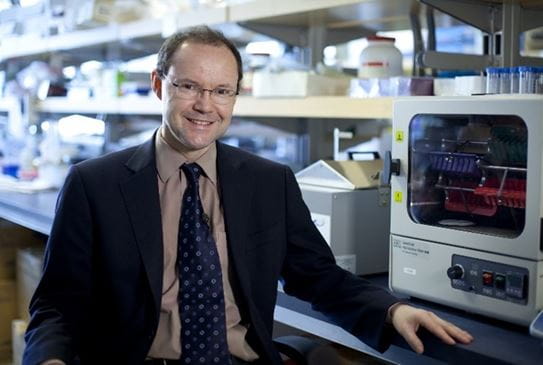A research grant from the Canadian Cancer Society (CCS) can change the lives of so many. It supports new research breakthroughs but can also inspire someone to make a difference at the beginning of their career. Dr David Huntsman knows this first-hand. His first research grant enabled him to make key discoveries to help families deal with hereditary stomach cancer. And 20 years later, he hopes his work will inspire future generations to create a brighter future.

Propelling research progress to help families across Canada
When he began his medical career as a family doctor, Dr Huntsman quickly felt that there wasn’t enough information about some diseases that were affecting people every day. To address this, he specialized in pathology and genetics and then became a researcher. Working closely with families from British Columbia, Newfoundland and across Canada, he eventually advanced our understanding and treatment of hereditary stomach cancer.
"It was incredibly rewarding to get to know the beneficiaries of my research and, as I grew up in St. John’s, to be able to give back to that community," he said.
After building a globally impactful research team, Dr Huntsman decided to change course. A new team needed his help and offered an opportunity for him to make a difference through research.
Creating a team to change the future of ovarian cancer
Dr Dianne Miller was the leader for ovarian cancer care in British Columbia when she contacted Dr Huntsman.
She said, ‘I’m sick of seeing women die from this disease. If we form a team to research ovarian cancer, we could do so much.’ I realized we had the key pieces required to build an impactful team and so, I offered to put together a business plan.
Along with other doctors and researchers with a variety of expertise, OVCARE was formed and supported by the BC Cancer, Vancouver General Hospital and UBC Hospital foundations.
The team had a vision to make new discoveries for ovarian cancer that would be clinically relevant to patients. Some of the discoveries they made together have now become the standard when diagnosing ovarian cancer.
“We realized that ovarian cancer isn’t a single problem - it’s multiple problems,” Dr Huntsman said. “We proved there are 45 different types of ovarian cancer, and they should be treated that way in the clinic.”
When the OVCARE team learned that ovarian cancers start in or pass through fallopian tubes, as opposed to starting in the ovary, this created an opportunity for cancer prevention. And with this discovery, they started a prevention program. They now recommend that fallopian tubes be removed in surgery whenever possible to remove or massively reduce the risk for ovarian cancer. The OVCARE team has since expanded its mandate to embrace population-based approaches to decrease death and suffering from gynecologic cancers by 50%.
“Along with local support, funding through CCS grants and career development awards has legitimized our efforts and been critical in enabling us to achieve our objectives,” Dr Huntsman said.
Giving hope to future generations
Being a mentor for early-career cancer researchers is very close to Dr Huntsman’s heart. He advocates for graduate students to receive better funding and gives advice to help them along their own paths whenever he can.
The best advice I can give would be to work on something you feel passionate about. And to work on something where you will see the advantage in your community. It’s incredibly rewarding to see the impact of your work on the people around you.
But above all else, Dr Huntsman hopes people across Canada continue to support CCS.
“All people in Canada should share aspirations and rights such as the right to top-quality cancer care,” he said. “As well, that solutions can be found and shared across Canada. CCS is an organization that we all share and can help make that happen.”
